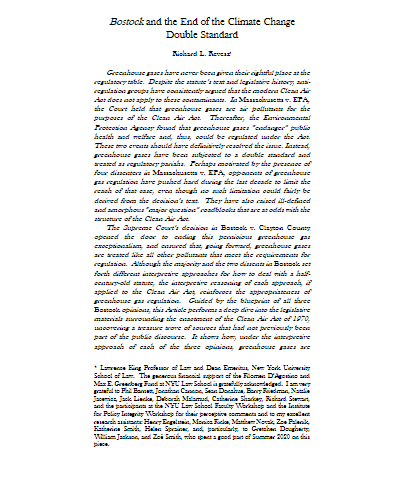Greenhouse gases have never been given their rightful place at the regulatory table. Despite the statute’s text and legislative history, anti-regulation groups have consistently argued that the modern Clean Air Act does not apply to these contaminants. The Supreme Court’s decision in Bostock v. Clayton County opened the door to ending this pernicious greenhouse gas exceptionalism, and ensured that, going forward, greenhousegases are treated like all other pollutants that meet the requirements for regulation. Although the majority and the two dissents in Bostock set forth different interpretive approaches for how to deal with a half-century-old statute, the interpretive reasoning of each approach, if applied to the Clean Air Act, reinforces the appropriateness of greenhouse gas regulation.
Guided by the blueprint of all three Bostock opinions, this article, published in the Columbia Journal of Environmental Law, performs a deep dive into the legislative materials surrounding the enactment of the Clean Air Act of 1970, uncovering a treasure trove of sources that had not previously been part of the public discourse. It shows how, under the interpretive approach of each of the three opinions, greenhouse gases are unquestionably pollutants for the purposes of the Clean Air Act. Because the approaches in the majority and dissents in Bostock—and thus a majority of the current Court—all point in the same direction, the era of greenhouse gas exceptionalism should now be over.

